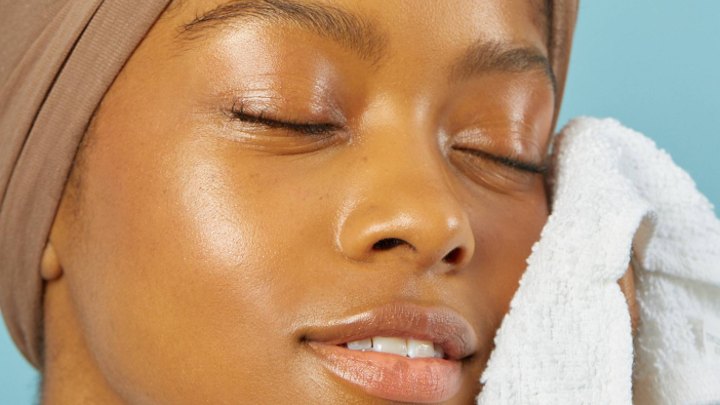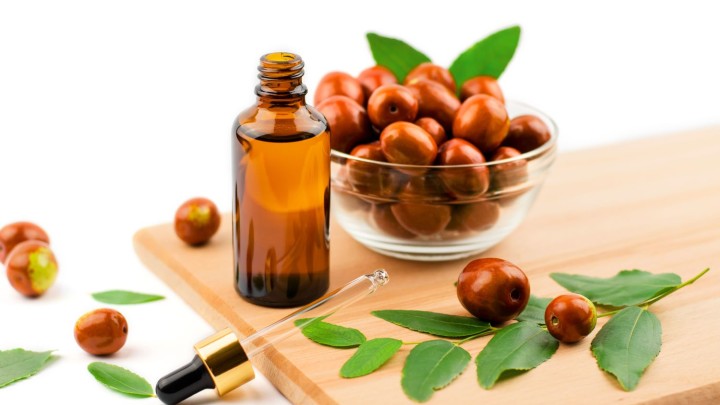Jojoba oil (jojoba wax ester) is an unrefined natural oil that works well with every skin type, and this makes it a perfect pick for your face.
It is no wonder that dermatologists and estheticians recommend jojoba oil to their clients. This oil effectively addresses a wide range of skin concerns (health and cosmetic). Moreover, it beats the many myths that have been said about applying oil to your face.
Jojoba oil has nutritional benefits that improve the appearance of facial skin. Also, it caters well to the delicate nature of facial skin. With this said, you should continue reading to see the many reasons why you need jojoba oil for your face.
Can you use jojoba oil on your face?
Jojoba oil is a dry, lightweight oil. This means that it quickly absorbs into your skin and leaves no residue.
Facial skin needs products and ingredients that will not leave residues because these residues may block your pores and lead to breakouts.
Unrefined jojoba oil is unscented and very suitable for the face. Its non-comedogenic nature is another reason why it is highly recommended for a face oil.
Additionally, jojoba oil is concentrated with essential fatty acids, vitamins, and minerals that fortify facial skin against irritants and pollutants that can affect the health of your face.
These vitamins help to attract and retain moisture in your skin. And moisture is necessary for every skin type. Diluted or undiluted, jojoba oil is good for your face.
You can either use it as face oil, mix it with your skincare products like moisturizers, or use it to dilute steam-distilled or chemically extracted oils like lavender oil, tea tree oil, and other essential oils.
Can you use jojoba oil on oily face?
If you have oily skin, it is easy to see oils as your skin’s dread. You may want to avoid oil and any oil-based products. Jojoba oil is a non-comedogenic, dry oil and this makes it a good fit for oily skin.
This oil makes the list of the top choice face oils for oily skin. Jojoba oil has a molecular structure that mimics that of sebum. As a result, it tricks your skin into not producing any more sebum.
Also, jojoba oil penetrates deep into the layers of your skin, helps to balance oil levels, and prevents clogged pores. This keeps your skin from looking greasy and breaking out with acne.
Furthermore, jojoba oil is very soothing and moisturizing, a necessary property for products used on oily skin.
Can you use jojoba oil to cleanse your face?
The cosmetic use of jojoba oil is for a facial cleanse.
Rather than using an alcohol-based product that can strip your face of its natural oils, you can use jojoba oil.
Makeup removers contain ingredients like alcohol, silicone, and sometimes fragrance which do not go well with facial skin.
Silicone, for instance, does not absorb into your skin. It leaves residues that can enlarge and clog your pores. Consequently, you develop blackheads.
Jojoba oil, on the other hand, is all-natural and safe for your face. Following the oil dissolves oil principle, this cold-pressed oil dissolves excess sebum that clogs in your pores, lifts debris, and nourishes your skin with nutrients.
This makes an easy and natural way of cleansing your face and achieving your goal of flawless, glowing skin. Also, it helps to clean off stubborn makeup residue from your face. Jojoba oil loosens their bond with your face and effortlessly lifts them off.
Besides, it is safe to use around your eye area, unlike other makeup removers that can irritate the skin around the sensitive parts.
Can you use jojoba oil for face acne?
Absolutely.
Jojoba oil is a recommended face oil if you are battling face acne. It has antibacterial, antifungal, and anti-inflammatory properties to complement its sebum mimicry. Therefore, it targets acne from the causative factors.
Jojoba oil inhibits the action of acne-causing bacteria and helps to prevent acne breakouts. Moreover, it soothes already inflamed skin that may be a result of acne formation, making the healing process faster.
This cold-pressed oil is a natural moisturizer. And moisturized skin is one step away from getting acne. It contains vitamin E, a natural humectant, that attracts moisture to your skin and boosts moisture levels.
In addition, jojoba oil contains other vitamins that help to ward off the penetration of irritants that can cause acne breakouts. As a moisturizing oil, jojoba oil keeps the skin around acne lesions moisturized and prevents scar formation.
However, if scars form, this oil is up to the task. It helps to fade acne scars. Vitamins like vitamin A are in high concentrations in jojoba oil. It increases cell turnover, stimulates tissue regeneration, and helps to fade acne scars.
Can you use jojoba oil to treat aging?
Jojoba oil is rich in vitamins A and E, vitamins that can help delay and treat signs of aging.
These vitamins are antioxidants that protect your skin from the formation of free radicals which may cause premature aging.
As an oil, it makes your skin supple and improves the appearance of these sudden skin structure changes. It plumps your skin with moisture and restores it to its youthful glory.
Additionally, these antioxidants synergize with essential fatty acids to stimulate collagen synthesis. As a result, jojoba oil promotes skin elasticity, cell, and tissue regeneration, and makes your skin firm. Also, it adds a natural glow to your skin.
Can you use jojoba oil for face moisturizer?
In reality, face oils cannot replace moisturizers, although they moisturize your skin.
Using oil to moisturize your face will suffice if you’re in a pinch. Jojoba oil has humectant and moisturizing properties which makes it ideal for your face.
The advantage jojoba oil has over moisturizers is that it does not evaporate. It acts as an occlusive seal over your skin and prevents moisture loss. However, it does not contain the active ingredients present in moisturizers.
During harsh weather conditions when moisturizers alone may not moisturize your skin enough, you can use jojoba oil or add some drops of the oil to your regular moisturizer.
Benefits of using jojoba oil for your face
Lightweight formula
If you’re looking for a non-greasy oil, jojoba oil is a perfect choice. It is lightweight, absorbs quickly, and does not leave residues; rather than that, it makes your skin glow.
Moisture retention
Every skin type needs moisture to thrive. Vitamin E in jojoba oil attracts water to your skin and keeps it hydrated. A steady hydration level is a key step to preventing a lot of skin conditions that bother every skin type.
Nutrient boost
Jojoba oil is packed with nutrients like omega-6 fatty acids, omega-9 fatty acids, vitamins A, D & E, and minerals like copper and zinc. And each of these compounds is highly beneficial for the overall health and appearance of your skin.
They work in tandem to hydrate your skin, fortify it against harsh weather conditions and manage skin conditions like acne, eczema, and inflammation.
Repair sunburned skin
Jojoba oil hydrates your skin and helps to repair sunburned skin. Too frequent and prolonged exposure to sun rays can lead to inflamed and irritated skin with uneven skin tone.
Moreover, facial skin is one of the most exposed parts of the body. This makes it very prone to getting sunburns.
Using jojoba oil as part of your daily routine can replenish moisture, keep your skin hydrated, prevent peeling, and eventually fade the dark patches that characterize sunburns. Consequently, your skin returns to its original complexion, plus, an uncompromised glow.
Enhances skin immunity
The essential fatty acids contained in this oil help to improve your lipid barrier which is necessary for the overall health of your skin.
The antioxidants present also help to enhance resilience and make your skin fight off irritants that can alter the appearance of your skin. A functioning barrier helps to prevent trans epidermal water loss, bacteria growth, the harsh effect of UV rays, and infections.
Anti-inflammatory
Jojoba oil soothes and calms irritated skin. Facial skin may get inflamed due to dryness, and bacterial and fungal activities.
The topical application of the oil alleviates dryness and plumps your skin with moisture which helps to restore normalcy. This makes jojoba oil exceptionally cool for treating eczema, rosacea, and psoriasis.
Natural sunblock
Jojoba oil is a natural sunscreen. You’ll find it a common ingredient in sunscreen lotions. Vitamin E protects facial skin and rather absorbs harmful sun rays, warding off free radicals and retaining moisture.
In addition, it gives your skin a break from commercial sunscreens that may contain chemicals.
How to use jojoba oil
For acne face mask
Use jojoba oil with a clay mask (preferably bentonite clay mask) to treat and dissolve clogs and get rid of acne. However, because masks can be too drying, they shouldn’t be an everyday routine.
- Mix equal parts of jojoba oil with the clay to make a thick paste
- Stir the paste well with a wooden spoon until it has a smooth consistency. If it feels too thick, you may add little water to make it lighter
- Afterward, use the paste to mask your face
- Leave the mask on for 10-15 minutes
- Then, rinse it off with warm water
- Thereafter, layer on moisturizer to replenish moisture
Do this 2-3 times a week until you see results
Face lightening
To get rid of scars and dark patches, follow these steps to make a DIY face-lightening scrub:
Put about 5 tablespoons of jojoba oil in an amber glass bottle
- Then, add half a teaspoon of licorice root extract to the bottle
- Cover the bottle firmly and shake the contents to mix both liquids
- Apply the mix all over your face using a cotton pad
- Leave it on your face for 30-45 minutes
- Thereafter, rinse it off with lukewarm water
FAQs

Can you use jojoba oil on your face every day?
Yes, you can.
Jojoba oil is not known to purge skin or cause adverse side effects. So, you can use it as part of your morning and evening routine to seal in moisture and make your skin supple.
Do you use jojoba oil before or after moisturizer?
Use jojoba oil after moisturizer to seal in moisture and keep your skin hydrated. Oils come in at the end of your routine, after moisturizer and creams, and before sunscreen and makeup.
Is jojoba oil bad for your face?
No, it’s not.
Jojoba oil has few to no reports of causing any side effects. It is best suited for every skin type and leaves no residue. However, on first contact, some people may experience redness and slight itching (which shouldn’t last long).
Before you fully incorporate this oil into your routine, you should do a patch test to see how your skin reacts to the oil.
Conclusion
You shouldn’t cringe when you hear you need jojoba oil for your face anymore. This oil has proved beyond doubt that it is good for the face. It is non-comedogenic, lightweight, and suits every skin type.
Jojoba oil serves many skincare purposes and this is why it has caught the eyes of beauty and skin experts. All you need is a bottle and the right application methods to reap the amazing benefits.
Most importantly, you do not need so much at a time; a few drops will make your skin feel like it just had a glass of water.
Thanks for reading.
Check AfricanaStyle to read the best guides on skincare ingredients and routines.
